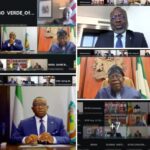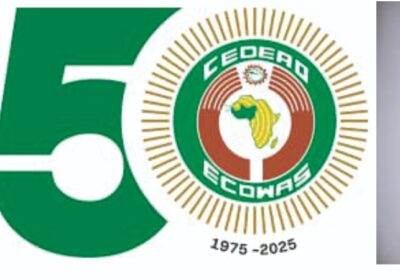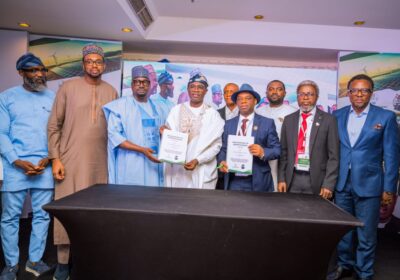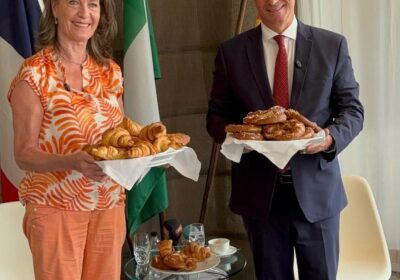Guinea-Bissau Coup Swiftly Condemned as AU, ECOWAS and West African Elders Demand Immediate Return to Constitutional Order.
By Raymond Enoch
A fragile but hopeful democratic moment in Guinea-Bissau has been thrown into uncertainty after the country’s armed forces announced a coup d’état just as citizens awaited the results of the 23 November 2025 presidential and legislative elections.
In a rare and forceful joint statement issued in Bissau on 26 November 2025, the Heads of the African Union Election Observation Mission (AUEOM), the ECOWAS Election Observation Mission (EOM), and the West African Elders Forum condemned what they described as a “blatant attempt to disrupt the democratic process” and called for urgent continental and regional action to restore constitutional order.
The communiqué, signed by three heavyweight figures in African diplomacy and governance – H.E. Filipe Jacinto Nyusi, former President of Mozambique and Head of the AUEOM; H.E. Issifu Baba Braimah Kamara, Head of the ECOWAS EOM; and H.E. Goodluck Jonathan, former President of Nigeria and Head of the West African Elders Forum – places Guinea-Bissau back in the spotlight as West Africa grapples with renewed threats of military takeovers.
The joint missions began by welcoming what they called the “orderly and peaceful conclusion” of voting across Guinea-Bissau. They praised the strong civic engagement of the electorate and the professionalism of polling staff, security agents, and party representatives who helped steer the 23 November elections. According to the statement, the vote had proceeded in a calm atmosphere and with promising signs for democratic consolidation, raising expectations that Guinea-Bissau – long plagued by instability and recurrent coups – was finally turning a corner.
That optimism was jolted abruptly. The missions expressed deep concern that the armed forces chose to announce a coup while the nation was still waiting for official results. The timing, they stressed, was especially troubling because it came immediately after they had met with the two leading presidential candidates, both of whom, the statement notes, had given assurances of their willingness to accept the will of the people.
In unusually direct language, the three missions “deplored” what they termed a clear attempt to derail the electoral process and roll back the “gains that have been achieved thus far.” They urged the African Union and ECOWAS to “take the necessary steps to restore constitutional order,” a diplomatic but firm signal that the situation has crossed a red line for the region and the continent’s democratic architecture.
The joint statement also expressed alarm over reports that top officials, including those responsible for managing the electoral process, had been arrested. The missions called on the armed forces to immediately release all detained officials so that the vote tabulation and formal proclamation of results can proceed to their logical and lawful conclusion.
Mindful of the potential for street tensions in a country with a history of political volatility, the three missions appealed directly to the people of Guinea-Bissau to remain calm and avoid violence. “We reaffirm our commitment to supporting the country on its democratic path,” the statement emphasized, underlining the missions’ resolve to stand by Bissau-Guineans as they navigate this critical moment.
They further stressed the importance of preserving peace, stability, and the well-being of the Bissau-Guinean people during this sensitive period, framing the defense of constitutional order not merely as a legal necessity, but as a safeguard for the daily lives and aspirations of citizens.
The strong wording of the joint declaration is amplified by the profile of its signatories. H.E. Filipe Jacinto Nyusi, who led Mozambique through complex political and security challenges, now heads the African Union Election Observation Mission in Guinea-Bissau. H.E. Issifu Baba Braimah Kamara speaks for the ECOWAS Election Observation Mission, reflecting the bloc’s direct stake in regional stability and democratic norms. H.E. Goodluck Jonathan, widely regarded as a key diplomatic figure in West Africa’s mediation efforts, leads the West African Elders Forum and brings moral weight and experience from Nigeria’s own democratic transitions.
Their aligned voices send a clear message: the regional and continental community will not casually accept a reversal of Guinea-Bissau’s electoral process at the point where citizens are awaiting the verdict of the ballot box. As Guinea-Bissau stands at yet another crossroads, the joint statement sets the tone for what comes next – a test of whether national actors, backed by Africa’s institutions, can steer the country back from the brink and allow the will of the people, expressed on 23 November 2025, to prevail.








